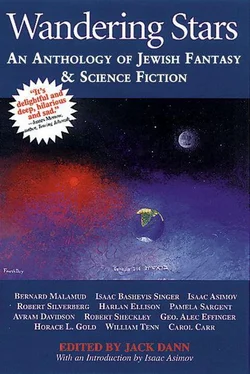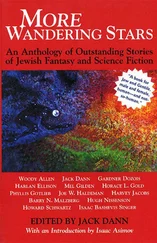“Damned right,” Carmody said, lighting a cigarette.
“But my failure,” the city said.
“No, no,” Carmody said. “Don’t say it, please don’t!”
“Forget I said it,” the city said.
“All right.”
“Sometimes I get overzealous.”
“Sure.”
“And it’s especially difficult because I’m right. I am right, you know.”
“I know,” Carmody said. “You’re right, you’re right, you’re always right. Right right right right right—”
“Don’t overexcite yourself bedtime,” the city said. “Would you care for a glass of milk?”
“No.”
“You’re sure?”
Carmody put his hands over his eyes. He felt very strange. He also felt extremely guilty, fragile, dirty, unhealthy and sloppy. He felt generally and irrevocably bad, and it would always be this way unless he changed, adjusted, adapted….
But instead of attempting anything of the sort he rose to his feet, squared his shoulders, and marched away past the Roman piazza and the Venetian bridge.
“Where are you going?” the city asked. “What’s the matter?”
Silent, tight-lipped, Carmody continued past the children’s park and the American Express building.
“What did I do wrong?” the city cried. “What, just tell me what?”
Carmody made no reply but strode past the Rochambeau Cafe and the Portuguese synagogue, coming at last to the pleasant green plain that surrounded Bellwether.
“Ingrate!” the city screamed after him. “You’re just like all the others. All of you humans are disagreeable animals, and you’re never really satisfied with anything.”
Carmody got into his car and started the engine.
“But of course,” the city said, in a more thoughtful voice, “you’re never really dissatisfied with anything either. The moral, I suppose, is that a city must learn patience.”
Carmody turned the car onto King’s Highbridge Gate Road and started east, toward New York.
“Have a nice trip!” Bellwether called after him. “Don’t worry about me, I’ll be waiting up for you.”
Carmody stepped down hard on the accelerator. He really wished he hadn’t heard that last remark.
ISAAC BASHEVIS SINGER
Jachid and Jechidah
Hell’s bells tinkle in urban glades where love is an infirmity leading to death, where green fields and blue skies are the manifold blessings of corruption and the vulgarity of death is nothing but a short episode in the eternity of life. Isaac Bashevis Singer, a recognized master of Jewish fiction, pours black paint over modern man’s favorite philosophical toys with a cheerful vengeance. With the blind, mocking eyes of an omniscient skeptic he examines acceptable reality, throws stones at it, and pushes past its cardboard parameters. The result is a happy exercise in Jewish iconoclasm.
—J.D.
*
IN A PRISON where souls bound for Sheol—Earth they call it there—await destruction, there hovered the female soul Jechidah. Souls forget their origin. Purah, the Angel of Forgetfulness, he who dissipates God’s light and conceals His face, holds dominion everywhere beyond the Godhead. Jechidah, unmindful of her descent from the Throne of Glory, had sinned. Her jealousy had caused much trouble in the world where she dwelled. She had suspected all female angels of having affairs with her lover Jachid, had not only blasphemed God but even denied him. Souls, she said, were not created but had evolved out of nothing: they had neither mission nor purpose. Although the authorities were extremely patient and forgiving, Jechidah was finally sentenced to death. The judge fixed the moment of her descent to that cemetery called Earth.
The attorney for Jechidah appealed to the Superior Court of Heaven, even presented a petition to Metatron, the Lord of the Face. But Jechidah was so filled with sin and so impenitent that no power could save her. The attendants seized her, tore her from Jachid, clipped her wings, cut her hair, and clothed her in a long white shroud. She was no longer allowed to hear the music of the spheres, to smell the perfumes of Paradise and to meditate on the secrets of the Torah, which sustain the soul. She could no longer bathe in the wells of balsam oil. In the prison cell, the darkness of the nether world already surrounded her. But her greatest torment was her longing for Jachid. She could no longer reach him telepathically. Nor could she send a message to him, all of her servants having been taken away. Only the fear of death was left to Jechidah.
Death was no rare occurrence where Jechidah lived but it befell only vulgar, exhausted spirits. Exactly what happened to the dead, Jechidah did not know. She was convinced that when a soul descended to Earth it was to extinction, even though the pious maintained that a spark of life remained. A dead soul immediately began to rot and was soon covered with a slimy stuff called semen. Then a grave digger put it into a womb where it turned into some sort of fungus and was henceforth known as a child. Later on, began the tortures of Gehenna: birth, growth, toil. For according to the morality books, death was not the final stage. Purified, the soul returned to its source. But what evidence was there for such beliefs? So far as Jechidah knew, no one had ever returned from Earth. The enlightened Jechidah believed that the soul rots for a short time and then disintegrates into a darkness of no return.
Now the moment had come when Jechidah must die, must sink to Earth. Soon, the Angel of Death would appear with his fiery sword and thousand eyes.
At first Jechidah had wept incessantly, but then her tears had ceased. Awake or asleep she never stopped thinking of Jachid. Where was he? What was he doing? Whom was he with? Jechidah was well aware he would not mourn for her for ever. He was surrounded by beautiful females, sacred beasts, angels, seraphim, cherubs, ayralim, each one with powers of seduction. How long could someone like Jachid curb his desires? He, like she, was an unbeliever. It was he who had taught her that spirits were not created, but were products of evolution. Jachid did not acknowledge free will, nor believe in ultimate good and evil. What would restrain him? Most certainly he already lay in the lap of some other divinity, telling those stories about himself he had already told Jechidah.
But what could she do? In this dungeon all contact with the mansions ceased. All doors were closed: neither mercy, nor beauty entered here. The one way from this prison led down to Earth, and to the horrors called flesh, blood, marrow, nerves, and breath. The God-fearing angels promised resurrection. They preached that the soul did not linger forever on Earth, but that after it had endured its punishment, it returned to the Higher Sphere. But Jechidah, being a modernist, regarded all of this as superstition. How would a soul free itself from the corruption of the body? It was scientifically impossible. Resurrection was a dream, a silly comfort of primitive and frightened souls.
One night as Jechidah lay in a corner brooding about Jachid and the pleasures she had received from him, his kisses, his caresses, the secrets whispered in her ear, the many positions and games into which she had been initiated, Dumah, the thousand-eyed Angel of Death, looking just as the Sacred Books described him, entered bearing a fiery sword.
“Your time has come, little sister,” he said.
“No further appeal is possible?”
“Those who are in this wing always go to Earth.”
Jechidah shuddered. “Well, I am ready.”
“Jechidah, repentance helps even now. Recite your confession.”
“How can it help? My only regret is that I did not transgress more,” said Jechidah rebelliously.
Both were silent. Finally Dumah said, “Jechidah, I know you are angry with me. But is it my fault, sister? Did I want to be the Angel of Death? I too am a sinner, exiled from a higher realm, my punishment to be the executioner of souls. Jechidah, I have not willed your death, but be comforted. Death is not as dreadful as you imagine. True, the first moments are not easy. But once you have been planted in the womb, the nine months that follow are not painful. You will forget all that you have learned here. Coming out of the womb will be a shock; but childhood is often pleasant. You will begin to study the lore of death, clothed in a fresh, pliant body, and soon will dread the end of your exile.”
Читать дальше












